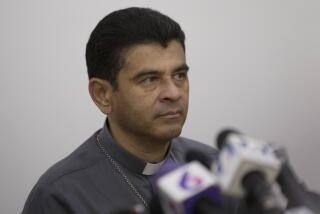Spent 30 Years in Chinese Jail : Bishop of Shanghai Recovers, Catches Up
- Share via
STAMFORD, Conn. — The bishop of Shanghai arrives promptly at 6:45 every morning to say Mass in Chinese at a private Stamford chapel. He is accompanied by the assistant charged with teaching him the modern ways of the Roman Catholic Church.
Observers of his daily ritual say that Bishop Ignatius Kung is a quick student considering his heart condition, 30 years of imprisonment in a Shanghai jail and the fact that until recently he said Mass only in Latin.
Kung, who was an international symbol of resistance to the Chinese government’s religious intolerance during his incarceration, has been living in seclusion here since May after arriving in the United States to seek medical care.
The rightful bishop of Shanghai in the eyes of the Vatican, Kung is also learning about the church he was exiled from in 1955 by the Chinese government. Kung’s Stamford relatives have kept his stay here secluded while he recuperates and waits for permission from Pope John Paul II to return to China.
The bishop, who recently turned 88, hopes to again serve as the spiritual leader of the Diocese of Shanghai.
Imprisoned because he refused to renounce the Pope, Kung now waits for the Holy See to determine his future role in the church in China.
Joseph Kung, a Stamford accountant and one of the bishop’s 20 relatives in the United States, negotiated his uncle’s medical visa with Chinese authorities during a visit to Shanghai in February, when they were reunited after a 35-year separation. The bishop, who has cataracts and suffered a heart attack last winter, has improved remarkably since he arrived here, his brother said.
“Before, he was living in a compound, isolated from the world,” Joseph Kung said. “He is recuperating at this time, but he is excited about learning about the world and the church he has missed.”
The bishop has met with foreign journalists three times since the Chinese government released him on “parole” from his life sentence in July, 1985. He has not commented on his imprisonment or his relationship with the Chinese government, except to maintain his loyalty to the Pope.
“He (Kung) realizes that you have to go at this quietly and carefully,” said Father Vincent O’Keefe, vice president of special projects for the U.S. Jesuit Conference. “He wants others to be released, and he wants a peaceful resolution to the issues facing the church in China.”
U.S. Catholic leaders estimate that there are at least 3 million Roman Catholics in China, a small percentage considering its more than 1 billion citizens.
Some observers familiar with the church there say that the number of practicing Catholics could be as high as 9 million, based on estimates of membership in underground churches.
The Chinese government’s position on religion has changed dramatically since Sept. 8, 1955, the day Kung was arrested and charged with “high treason” for refusing to renounce his ties with the Vatican.
The government’s Patriotic Catholic Church reports to the Chinese Bureau of Religious Affairs, which appoints bishops and other clergy. It has not adopted the changes brought by the Roman Catholic Church following the acceptance of Vatican II, which ended the practice of priests saying Mass in Latin with their backs to the congregation.
Two different bishops, both ordained as Roman Catholics, served as the Patriotic Church’s bishop of Shanghai during Kung’s imprisonment.
The Chinese government now permits the printing of Bibles, which once had to be smuggled into the country, and has reopened seminaries, said the Rev. John Witek, professor of history at Georgetown University in Washington.
New Religious Tolerance
While Kung’s release in 1985--which was followed by more than a year of house arrest in Shanghai--was hailed as evidence of a new religious tolerance, his chances of assuming any real authority in China may be determined by the Vatican’s relations with the Chinese government.
Several envoys from the Vatican, including three cardinals, have met with Patriotic Church leaders and officials of the Bureau of Religious Affairs during the last five years.
Sticking points in reconciliation talks have centered on the Vatican’s insistence that it appoint its own bishops and the Chinese government’s insistence that the church sever its ties with Taiwan.
Besides practicing Mass in Chinese daily, the bishop has met with other clergy for instruction on the church in the post-Vatican II era, Joseph Kung said. And the bishop has been supplied with new vestments and a proper bishop’s ring.
“It’s very clear that his intention is to return, and as far as Catholics are concerned, he is the bishop of Shanghai,” said Father John Houle, a Jesuit from Los Angeles who met with Kung here recently. “But he seems prepared to adapt himself to whatever is needed.”
More to Read
Sign up for Essential California
The most important California stories and recommendations in your inbox every morning.
You may occasionally receive promotional content from the Los Angeles Times.













